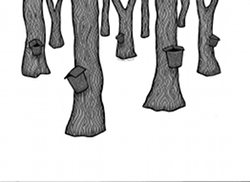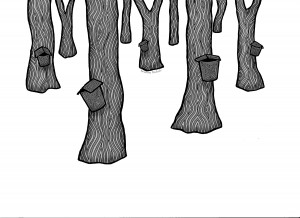

copyright the Chronicle March 4, 2015
by Joseph Gresser
BRIGHTON — The days of making maple syrup to raise a little cash for property taxes have been gone for quite a while now. But an Island Pond sugaring operation getting ready for its first season could usher in a whole new era of industrial sugaring.
Sweet Tree, LLC, started and owned by a Connecticut-based investment firm, just finished tapping trees on 3,600 acres in Warren’s Gore and will be ready to fire up the steam-powered evaporators at the old Ethan Allen furniture plant in Brighton as soon as the weather breaks.
So far, the company has about 95,000 taps out and plans to increase that number to at least 200,000 next year, when a second, almost 4,000-acre parcel in Avery’s Gore, is put into production.
That’s the word from Bob Saul, who works for Wood Creek Capital Management, a branch of Massachusetts Mutual Life Insurance Company, and owner of Sweet Tree.
Mr. Saul said Sweet Tree is also interested in sap from other farmers, if it meets the company’s standards.
The old Ethan Allen plant, which has two acres under its roof, has been turned into a state-of-the-art sugaring facility that is able to handle more sap than can be produced on the company’s current acreage. In addition to the new evaporators, refrigerated sap tanks are under construction in Island Pond, he said.
Richard Carbonetti, a vice-president at LandVest in Derby who helped put together the real estate aspects of the deal, said company workers started tapping trees on January 11 and finished their work on February 27. The company has hired a full-time crew, and they’re expected to work year round on the sugaring operation.
Before paying for the custom-made equipment at the old Ethan Allen plant, Sweet Tree has invested about $4.2-million in the project. That includes $700,000 for the Ethan Allen building and an adjoining lot, $2.9-million for the land in Warren’s Gore, and $2.6-million for the Avery’s Gore property, according to public land records.
Henry Markres the maple specialist at the state Agency of Agriculture, said the land was in conservation, making the production of maple syrup a logical use.
Wood Creek runs its business differently from most capital management firms, Mr. Carbonetti said. Instead of buying companies, making quick fixes to improve their bottom lines, and then selling them off for a profit, Wood Creek starts businesses and pays its investors out of the profits they earn, he said.
“Sweet Tree wants to be around for the next three or four decades,” Mr. Carbonetti said.
That means not cutting corners, he added.
If a building needs a roof, the company won’t go for a cheap, temporary fix but instead will put on one that will hold out the weather for the long term, Mr. Carbonetti said.
That also means offering good wages to find the right workers, he said.
“To build a workforce, you have to pay people fairly,” Mr. Carbonetti said.
Sweet Tree is not just hiring seasonal laborers.
“This is not a short-term project; you can make a career working in sugar,” Mr. Carbonetti said.
“I’ve run logging operations from Maine to Pennsylvania,” he said. “If you pay the right price, you get the right people. The results come back and pay you over.”
Sweet Tree applied the same principal when it contracted for forest management services in preparation for laying out pipelines in the woods, Mr. Carbonetti said.
“When we did thinning we paid contractors by the hour to do the work. We told them, your work is critical to our success.”
As a result, Mr. Carbonetti said, it’s hard to find a tree that was damaged during the thinning operations.
Another aspect of the company’s plan is to appeal to consumers looking for a quality product. Sweet Tree’s syrup will be certified as organic, kosher, and halal, the equivalent of kosher for Muslims.
Isn’t all maple syrup organic? It is, Mr. Markres said, assuming the trees have not been sprayed or given artificial fertilizers. He said he didn’t know of any sugar woods that are treated that way.
The difference is that organic certification requires the producer to follow other guidelines set by the Northeast Organic Farming Association (NOFA). Those include requirements that set limits on the number of taps per tree, Mr. Markres said.
“I love dried cranberries,” Mr. Carbonetti said, by way of explanation. “The last time I bought a package it said ‘gluten-free.’”
In addition to meeting NOFA’s organic standards, Sweet Tree has applied for recognition for certified sustainable forestry practices (CSF). If its application is approved, Mr. Carbonetti said, it would be the first CSF maple syrup operation in the country.
Sweet Tree won’t be the biggest sugarmaker in the state this year, said Mr. Markres, but with 200,000 taps out next year, there won’t be much competition for the title.
There are few other areas in the state that have the potential to match Sweet Tree’s size, he added.
The sap collected from the two properties will be concentrated by reverse osmosis before being trucked to Island Pond for boiling, said Mr. Saul.
Reverse osmosis raises the percentage of sugar in the sap by removing a percentage of the water. That makes it more economical to transport and means less energy is needed to convert the sap to syrup.
“It’s not wool coats and corn cob pipes,” Mr. Carbonetti said.
While it may seem like an operation the size of Sweet Tree’s could adversely affect the price of maple syrup for other producers, that’s not necessarily the case, Mr. Markres said.
The price of syrup is based on bulk sales, he said, and largely governed by the actions of the Federation of Quebec Maple Syrup Producers. Quebec is the world’s largest producer of maple syrup and at one time used to let prices fluctuate according to the size of the crop, Mr. Markres said.
That meant sugarmakers could never be certain what their syrup would fetch at the end of a season. In recent years the federation has changed its policy and no longer dumps excess syrup on the market, said Mr. Markres.
“Their goal is to keep the price high for Canadian producers,” he said.
In any event, Sweet Tree’s production should not hurt other Vermont producers because they’ve decided to market their product themselves, rather than try to sell it on the open market, said Mr. Markres.
Much of Sweet Tree’s production is headed overseas, according to Mr. Carbonetti, who said, “They don’t see themselves with other producers. They have an internal marketing system, they’re not trying to compete in existing markets.”
Mr. Carbonetti said that, in recent years, Vermont producers have exported syrup to ten new countries. The market is far from saturated, he said.
When wearing his consulting forester’s hat, Mr. Carbonetti said, he travels around the country. He’s often given Vermont maple syrup to colleagues, who tell him that once their children taste the real thing, they no longer accept the fake stuff.
That represents a potential for growth, he said.
China, too, has developed a taste for maple syrup, opening a huge potential market, he said.
Sweet Tree plans to sell more than syrup and candy, Mr. Saul said.
“It does go beyond sugar and candy. We’re looking at lots of other products, some that have been tested in the market and others just being developed,” he said.
“They’re not trying to sell syrup to Walmart,” said Mr. Carbonetti.
“Maple hits all the bases for a market that’s going to grow for decades,” said Mr. Saul.
Mr. Markres agreed.
“We’re seeing tremendous growth in the export market,” he said.
Vermont maple producers have advantages given them by state regulations, which call for a higher density product than is produced in other states, Mr. Markres said.
At the same time, he said, many producers are leaning heavily on reverse osmosis to produce a “commodity rather than a specialty product.”
“I see a bit of loss in the maple bouquet,” Mr. Markres said.
That may leave a big opening for traditional sugarmakers to present their products to an audience that already appreciates Vermont’s artisan cheese or craft beer, he said.
There’s a noticeable difference when sap is “put in the wood evaporator at 2 percent and boiled down to 67 or 68 percent,” Mr. Markres said.
With new markets opening up, there appears to be room for all types of producers to make their mark.
“I see good times ahead,” Mr. Markres said.
contact Joseph Gresser at [email protected]
For more free articles from the Chronicle like this one, see our Editor’s Picks pages. For all the Chronicle’s stories, subscribe:
Print subscription
Annual online subscription
Short-term online subscription







